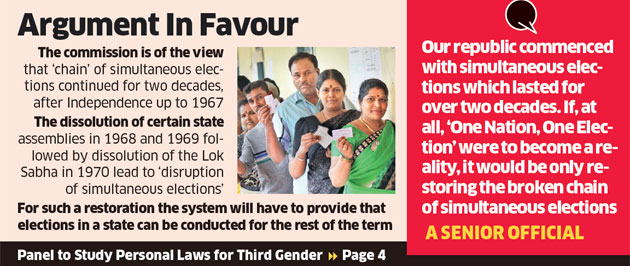


In his first Independence Day speech of his third term, Indian Prime Minister Narendra Modi addressed both ideological and political issues, calling for a "secular civil code" and advocating for simultaneous elections at both the national and state levels. By framing the BJP's call for a common civil code as a push for a "secular civil code", Modi aimed to rebut opposition claims that the party's goal is to replace Muslim personal law. Despite falling short of a majority in the Lok Sabha, Modi emphasized the need for continuity and unity through simultaneous elections.
Understanding the Call for a Secular Civil Code in India
Background
A civil code refers to a set of laws that governs personal matters for citizens, such as marriage, divorce, inheritance, and adoption. In India, religious groups follow their own personal laws based on their religious scriptures and customs. As a result, there are multiple parallel systems of law, leading to disparities and inequalities.
Narendra Modi's Call for a Secular Civil Code
In his 2019 Independence Day speech, Prime Minister Narendra Modi advocated for a "secular civil code" that would apply uniformly to all citizens, regardless of religion. He argued that such a code would promote gender equality, protect minority rights, and ensure a more just and equitable society.
BJP's Agenda and Opposition Claims
The Bharatiya Janata Party (BJP), led by Modi, has long pushed for a common civil code, which many see as a move to replace Muslim personal law with a Hindu-centric one. However, Modi's reference to a "secular civil code" aimed to dispel such concerns and present it as a step towards national unity.
Constitutional Implications
Article 44 of the Indian Constitution states that the state shall endeavor to secure for all citizens a uniform civil code throughout the territory of India. However, it has not been implemented due to resistance from religious groups and concerns about minority rights.
Top 5 FAQs
1. What is a secular civil code?
A secular civil code is a set of laws that govern personal matters based on secular principles, rather than religious beliefs or customs.
2. Why is a secular civil code being advocated in India?
Proponents argue that it would promote gender equality, protect minority rights, and ensure a more just and equitable society by eliminating disparities in personal laws based on religion.
3. What are the concerns of opponents?
Opponents fear that a secular civil code could undermine religious freedom and cultural identities, particularly those of minority groups.
4. Has India implemented a secular civil code before?
No, India has not yet implemented a secular civil code at the national level. However, the state of Goa has a uniform civil code that applies to all citizens, regardless of religion.
5. What is the current status of the secular civil code proposal?
The BJP-led government has not introduced any specific legislation on a secular civil code, but it remains a part of the party's agenda. The matter is likely to continue to be debated and discussed in the years to come.

In a heated verbal exchange, Maratha quota activist Manoj Jarange Patil accused NCP Minister Chhagan Bhujbal of attempting to create a rift between the OBC and Maratha communities for political gain. During a recent OBC rally in Beed, Bhujbal and Dhananjay Munde attacked Jarange, with Pankaja Munde, a BJP OBC leader, watching from the sidelines. Jarange also praised Chief Minister Devendra Fadnavis and Minister Pankaja Munde for staying away from the rally and emphasized the unity of the OBC community. Bhujbal, on the other hand, warned Jarange against challenging the community's rights and vowed to stand up against any attempts to divide them.

On the auspicious occasion of Bhai Dooj, Madhya Pradesh Chief Minister Mohan Yadav transferred a total of 44,900 crore directly into the bank accounts of 1.27 crore women beneficiaries under the Ladli Bahna Yojana. This initiative aims to support and empower women in the state, with each eligible woman set to receive 1,500 per month from November onwards. During the special program at the Chief Minister's residence, Yadav extended his wishes for a happy Bhai Dooj, emphasizing the importance of the brother-sister relationship and the government's commitment towards ensuring the safety and well-being of Ladli Bahnas in the state.

Union Home Minister Amit Shah celebrated the Gujarati New Year and his 62nd birthday in his hometown of Ahmedabad, surrounded by senior political leaders, party members, and well-wishers. Shah's rise in public life through the RSS and his partnership with Prime Minister Narendra Modi have shaped Gujarat's and India's political narrative. His sharp organisational mind, efficient approach, and booth-level political management have been key in building the "Gujarat model" that gave the BJP an enduring edge. Despite transitioning to national politics, Shah's political heart still beats in Ahmedabad, as evident in his New Year celebrations and plans to meet the newly appointed ministers of the Gujarat cabinet.

In a recent incident at the Vasai Fort in Maharashtra, a man dressed as Chhatrapati Shivaji Maharaj got into a heated argument with a security guard over language. The man, who was recording a video, berated the guard for not speaking Marathi and disrespecting the legacy of Shivaji Maharaj. Social media users were divided in their opinions, with some criticizing the man's behavior while others felt the guard needed to be taught a lesson.

In a significant moment for gender equality, President Droupadi Murmu became the first woman to visit the Lord Ayyappa Temple in Sabarimala. Accompanied by her team, she performed Darshan and Puja at the shrine, praying for the well-being and prosperity of her fellow citizens. Her visit symbolized the Supreme Court's decision to lift the ban on menstruating women entering the temple, reminding us that devotion knows no gender barriers.

With early voting just days away, the three major candidates vying to become New York City's next mayor are gearing up for the final debate in what could be their last chance to sway voters. The debate, hosted by Spectrum NY1, The City, and WNYC/Gothamist, will cover issues such as affordability, crime, and the role of former President Donald Trump in the city's politics. With the stakes high and the clock ticking, Democrats Zohran Mamdani and Andrew Cuomo and Republican Curtis Sliwa will need to make a strong case for themselves to secure the future of New York City.

CM Yogi Adityanath's statement about the role of "political Islam" in undermining Sanatan Dharma has sparked controversy and discussion throughout the nation. During an event organized by the Rashtriya Swayamsevak Sangh (RSS), he highlighted the struggles of Indian warriors against political Islam, claiming that this aspect of history is often overlooked. Adityanath's remarks have renewed debates on the representation of India's historical narrative and the impact of colonialism and political Islam.

Samajwadi Party chief Akhilesh Yadav's remarks questioning the government's spending on Diwali celebrations in Ayodhya, and his comparison to Christmas festivities worldwide, have sparked controversy. While the BJP has accused Yadav of being envious of Ayodhya's success, the Vishva Hindu Parishad has criticized him for undermining Indian culture. The comments highlight the tension between political parties over religious and cultural events.

On the occasion of Home Minister Amit Shah's 60th birthday, Maharashtra CM Devendra Fadnavis wished him with a special message on Twitter, calling him the "Chanakya of Indian politics." Fadnavis praised Shah's political acumen and leadership, stating that his contribution to the nation remains unmatched. PM Narendra Modi also conveyed his greetings, commending Shah's dedication to public service and national security. Leaders across India, including former Tamil Nadu CM Edappadi K Palaniswami, extended their wishes and praised Shah's steadfast leadership and tireless dedication.

On Home Minister Amit Shah's birthday, Prime Minister Narendra Modi took to social media to convey his wishes and praise his efforts towards improving India's internal security. Modi highlighted Shah's dedication to public service and hardworking nature, which has earned him admiration from across the country.